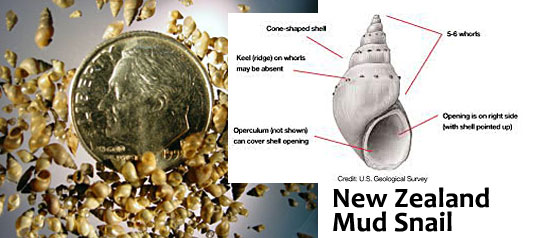The Michigan Department of Environmental Quality (MDEQ) and Department of Natural Resources (MDNR) today confirmed two new invasive species in Michigan waters.
MDEQ staff recently confirmed a freshwater alga commonly known as didymo or rock snot growing in extensive mats in the St. Mary’s River near Sault Ste. Marie. Additionally, MDEQ staff recently discovered New Zealand mud snails in the Pere Marquette River near Ludington.
Unlike other types of nuisance algae, didymo thrives in cold, clean water. Under the right conditions, didymo can grow into thick mats that cover the river bottom. The mats look and feel like wet wool, which is why the algae is sometimes called rock snot, although it’s not actually slimy. Didymo is not a threat to human health, but the formation of mats crowds out biologically valuable algae and invertebrates that are important food for fish. Additionally, thick didymo mats can become snagged in fishing gear and interfere with fishing and wading.
New Zealand mud snails are each only about 1/8 of an inch long, and can be difficult to see. However, they often cluster in high densities, and compete with native snails and other macroinvertebrates for food and space. Originally from New Zealand, the snails are now widespread in many western states and present in Wisconsin. They are easily transported and resilient, and can survive in damp environments for up to 26 days.
Both of these new invaders can easily attach to fishing equipment, wading gear and other hard surfaces and hitch a ride to a new environment. Anglers and boaters are reminded to take steps to clean, drain and dry their equipment to help prevent the spread of both didymo and New Zealand mud snails, as well as all types of aquatic invasive species. Boaters are required by law to remove aquatic plants before launching, as well as to drain live wells, bilges and all water from boats before leaving the access site. Additionally, boaters and anglers are encouraged to clean boats and equipment, including waders, with hot water or a dilute bleach solution, and allow to dry for at least five days before reusing, when possible.
Report any new sightings of didymo, New Zealand mud snails or other invasive species to the MDEQ or MDNR at www.michigan.gov/aquaticinvasives or the Midwest Invasive Species Information Network at www.misin.msu.edu.



